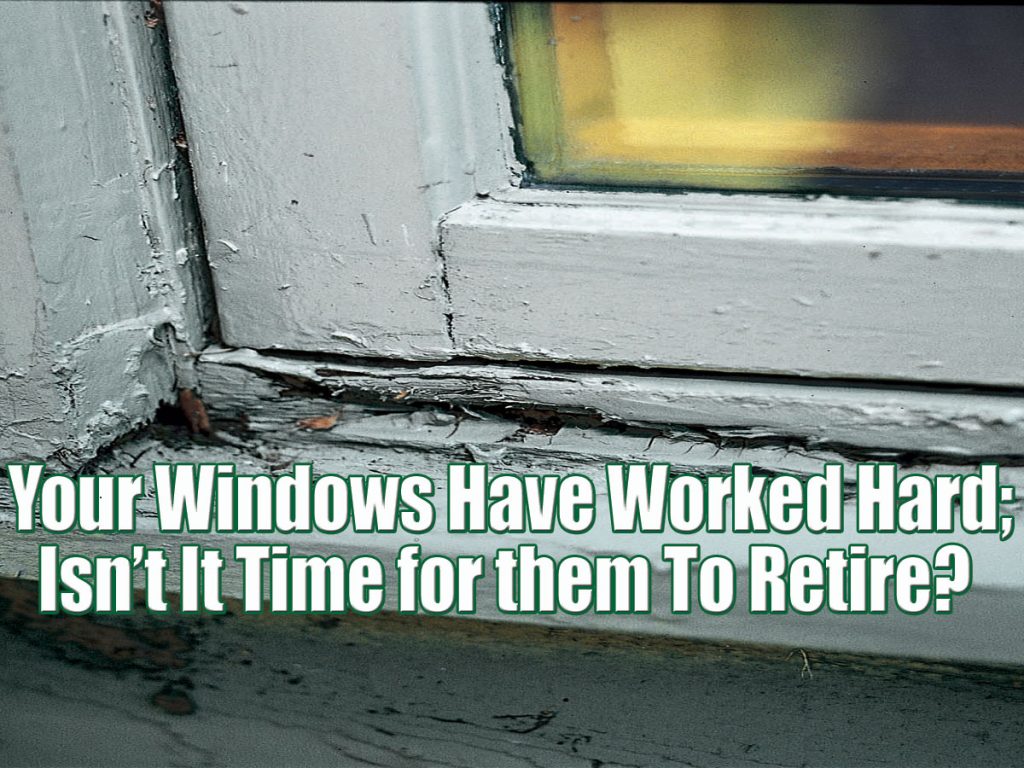

In our Renewal by Andersen Four Pillars of a Great Replacement Window Experience series, we talk frankly about the process of replacing home windows — from inspiration to style selection and adding decorative elements to installation. This series of posts, which was also collected into an eBook is our way of answering many of the most common questions we’ve heard over the years from New Jersey and New York Metro homeowners. We’re always happy to answer questions for our customers and those who are in the early stages of researching replacement window and patio door options.
But this week, we’d like to turn the tables around and ask you a question:
Are your windows telling you it’s time you considered replacing them with modern, energy-efficient windows?
In the series mentioned above, we explain that windows can only perform as designed and built when they are properly installed and maintained. Assuming your windows aren’t brand new and you aren’t trying to remediate a poor installation, let’s talk about how “normal” aging leads to low performance and what homeowners need to watch for so they can spot potential problems early.
Signs Your Windows Aren’t Aging Gracefully
Over the years, normal wear and tear can cause issues that reduce overall performance and energy-efficiency. Constant friction gradually wears down weather stripping. Ultraviolet light and extreme temperature variances can fade paint and cause vinyl frames to warp. Accidental impact cracks glass. You can paint faded frames and trim and replace weather stripping, but straightening out bent vinyl or metal frames isn’t an easy chore. If you have a broken pane, but otherwise, your window is still structurally sound, it’s possible to replace the pane without replacing the entire window. But just replacing the pane won’t necessarily restore the window to pre-damage performance levels. Broken glass in a double-paned window unit results in the gas fill escaping. No gas fill means your window isn’t able to control heat transfer as effectively, and energy efficiency drops dramatically.
In the absence of something as obvious as a hole in your window, here are a few ways to tell if your windows are aging beyond their usefulness.
#1 Windows Stick & Hang
When it becomes difficult to open and close your windows, they are probably nearing the end of their lifecycle. Of course, you should inspect each window to be sure there isn’t just a loose screw interfering with operation, debris in sliding window tracks or some other minor problem that can be quickly and easily remediated. Sometimes, it’s possible to order replacement parts to correct some issues, providing your windows aren’t extremely old and you know the original manufacturer and window style.
#2 You Can Feel Drafts In, or Around, Windows
Sagging, warped frames often pull away from the building envelope, creating air and moisture leaks. There are other things that can cause drafts, such as improperly installing shutters, failed sealants and damage to window components caused by drilling into the frame to hang window treatments or as part of a home security system update. Anytime you can feel cold air coming In around your window, it’s time to take action.
#3 Condensation is Problematic
Even high-quality replacement windows can have minor issues with fog and condensation if indoor humidity levels are high, but if you seem to have excessive fogginess, you need to investigate the source and take corrective measures to reduce or eliminate the problem. You don’t have to live with a cloudy perspective when you can enjoy a crystal clear view of the world beyond your glass.
#4 Your Windows Are Chipped, Rusting, Stained and Just Plain Ugly
Let’s face it. Old, outdated windows can be an eyesore. Wood frames have to be scraped, sanded and painted every year or so to prevent water from causing damage and gouges from leading to irreparable destruction. Old styles can detract from the overall aesthetic of your home, especially if you have updated paint colors or added new architectural features since your original windows were installed. Why put up with laborious maintenance when you can free yourself from the annual cleaning and painting tasks, and gain a more attractive appearance with less effort?
If you spend a little bit of time “listening” to your windows, they’ll let you know when they are ready for retirement. Sometimes, it can be difficult to know whether you should invest the time and money to fix minor window and patio door issues and when to think about upgrading to modern fixtures. We can help. Just give us a call to schedule a free, in-home consultation or fill in the short form on this page and we’ll call you back to schedule a time that is convenient for you. Dial (866) 609-5033. The call is free, the consultation is free. What are you waiting for?
Check out this post for more information on what to do if your windows are leaking.

Learn Everything You Need to Know BEFORE Buying Replacement Windows